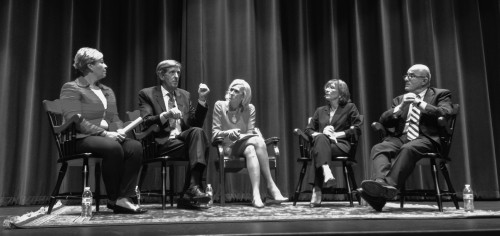As the Menino era comes to a close, Suffolk’s C. Walsh Theatre hosted a Ford Hall Forum, “The Menino Legacy.”
The Sept. 26 debate moderated by Mary Jo Meisner, the vice president of the Boston Foundation, the forum included a panel of four distinguished and civic-minded professionals.
In his introduction, Suffolk President James McCarthy noted that the public discussion was meant to look at the future of Boston, and the legacy of long-standing Mayor Thomas Menino.
A majority of the discussion was on the politics behind the preliminary election, which State Representative Martin Walsh and City Councilor John Connolly, vaulted forward in last Tuesday. Throughout the discussion, panelists considered how geographical and racial politics played a role in the election. Walsh and Connolly, both Irish-American, are from Dorchester and West Roxbury, respectively.
Larry DiCara, partner at Nixon Peabody, former teacher at Harvard, Boston University, and UMass, and former member of the Democratic State Committee Association and City Council, said, “The two finalists look like most of the kids I grew up with. The smaller the turnout, the older it is, the whiter it is, the more Catholic, etc.”
This could be true, considering the turnout. Walsh won 18 percent of the overall votes and Connolly came in close at 17 percent.

(Photo courtesy of Ford Hall Forum)
Joan Vennochi, op-ed columnist for the Boston Globe and professor at Suffolk University said, “This is an epic battle that involves a very small slice of Boston, I think that’s very sad.”
Does this mean that these candidates won mostly because of the low turnout? Not everyone on the panel believed so.
Mary Anne Marsh, principal at Dewey Square Group, a consulting firm that specializes in public affairs and strategic communications campaigns, pointed out that the candidates that made it through to the next level are the ones that have spent years preparing, even before Menino announced that he wouldn’t be running again.
“You don’t win an academy award until you’ve done Broadway, [and] you don’t get into the Hall of Fame without doing hundreds of free throws. Politics is no different,” she said.
For the final election in November, John Nucci, vice president of government relations and community affairs at Suffolk University, questioned whether or not minorities will vote for either Walsh or Connolly.
“If I were a candidate, I would wear my progressive credentials on my sleeve.” On that same note, DiCara contends that minorities “will not vote monolithically” in the final election for mayor.
Marsh candidly said, “none of the candidates had a campaign for change.” This shows that Menino “has run a campaign that works.” Which is true, at the time Menino announced he wasn’t seeking reelection he had about 75 to 80 percent popularity, according to Nucci. Menino is accredited with leaving the city in great financial shape and for many developments throughout Boston in the last 20 years, including the development of the Innovation District. On the other hand, Vennochi said she would give Menino a “C” grade on schools, and that diversity and inclusion of minorities in public administration positions was something to be worked on.
The forum then opened up the floor for questions from audience members. One audience member wondered where the voter who was opposed to charter schools but supportive of the betterment of public schools would go. Another audience member asked, “Why haven’t we heard much about the business development, or the business community?” To that, the panel responded, “The business community likes to be with the winner, and someone who’s aligned with their interests.” After a question on the proposed casino at Suffolk Downs, most of the panel agreed that casino development in the area would now be an area of major political concern. Likewise, no matter which candidate wins the next race, their legacy will be married to the issue of casino development in Massachusetts.
For more Ford Hall Forum events, visit fordhallforum.org.
















